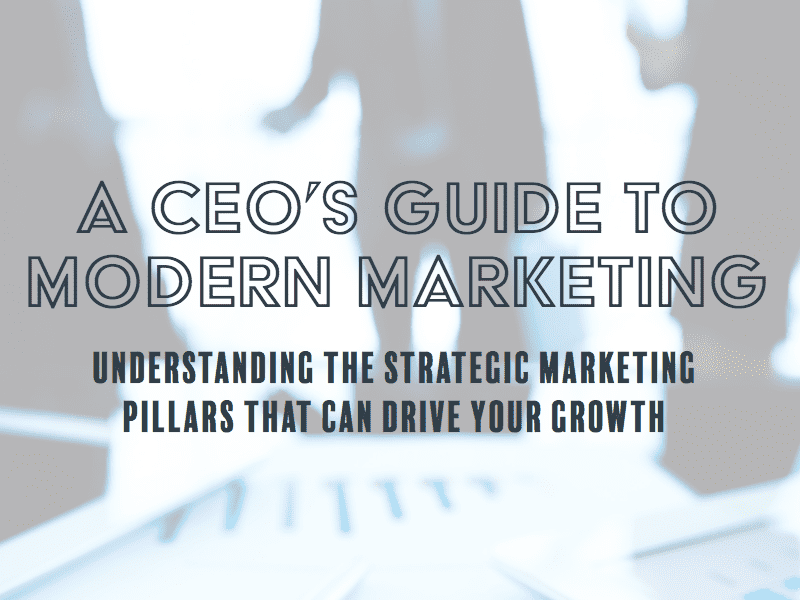4 Ways to Make Your Strategic Marketing Plan Better
We’ve all hit those problems. The stifling sort, that puzzle and stump, that confound and frustrate. But we’ve also experienced moments of solution. The Eurekas of enlightenment, when what was once so baffling suddenly becomes unstuck.

And perhaps it’s no surprise that often, the difference between unsolved and crystal clear is a change of perspective.
Marketing is no different. If you find that you’re stuck in creating your strategic marketing plan, then it might be time to shift your point of view. Here are four ways to get a new look at the same old problem.
Get your employees to weigh in.
When we work with clients on a strategic marketing plan, we usually start with a leadership interview. We’ll sit around a conference table and chat about business goals, competition, and nuances. And hopefully, we get a glimpse at how a company’s leaders view their company.
Then, we like to run an anonymous employee survey.

Employees under the protection of anonymity often give surprisingly candid and critical feedback. When you’re trying to position a company in a market, that honesty can make all the difference. It gives us a much more rounded understanding of a company. And we can feel confident that we’re playing to a company’s real strengths, rather than hubris or pretense.
Employees can offer a real-world perspective into your company’s strengths and weaknesses. If you find yourself unsure of how to move forward with your marketing, a jolt of honesty might just do the trick.
Stop building a strategic marketing plan to mimic what your competitors are doing, and instead dial in on what they’re not doing.
It’s easy to Google the competition, which can be a real bother if you’re trying to create something unique. When you’re in a comparative state of mind, it can be difficult to think about strategic opportunities. Instead, you might fixate on tangible elements like page layouts, branding, videos, or taglines. (In which case, you’d be thinking tactics before strategy.)
You’ll never win by playing catch-up with your competitors’ existing tactics. Instead, consider what they’re not doing. What’s an angle they’re not chasing? What could they do better with? What’s a strength of yours that they haven’t fully developed? What aren’t they expecting from you?
Instead of replicating what you see in a competitor, try focusing on exploiting the gaps in their armor. This approach can help you carve a valuable niche for your business.
Ask a customer for a heart-to-heart.
In times of busy-ness, companies can lose sight of their customers. They can focus on the transactional aspects of their business, and neglect the personal ones.
The customer experience is much more than whether a customer receives a given product or service. It involves a lot of intangibles, like their expectations, their impressions, their engagement, and their definition of value.
Think of it this way: if a company’s brand is the promise, the customer experience is the delivery of that promise. Marketing’s role in the customer experience is to make brand promises the rest of the business can keep.
People who have walked the road from lead to paying customer have a valuable understanding of your customer experience. Reach out to them, and ask for their honest feedback. What do they consider your greatest assets? What do they think your company should improve? What surprised them? What disappointed them?

Ultimately, the goal of any marketing strategy is to attract more customers. So start with the customers you have today, and use their perspective to help you figure out how to get more customers tomorrow.
Bring in an objective third-party to promote dialog.
The politics of business can make it difficult for people to open up. If your culture isn’t inviting, employees fear repercussions, or customers feel awkward offering critique, it can be helpful to enlist an objective third-party consultant.
When we’re asked to work on a B2B marketing plan, our objective stance usually helps people offer feedback they might have otherwise withheld. And they’re usually encouraged by the fact that the client invested in marketing help. It shows the client cares enough to put budget behind it.
Now, you might not be ready to bring in outside help. But just keep in mind that sometimes, if you find it difficult to build a strategic marketing plan, it might help to recruit a consultant.
Thanks for reading!
For more B2B marketing insights, consider subscribing to our blog. You can get updates sent to your inbox whenever we post new content. If you want to learn more about the benefits of strategic marketing plans, you can also check out our free guide by clicking on the image below.

We’ll see you soon!
Check out these recent insights from our subject matter experts.





